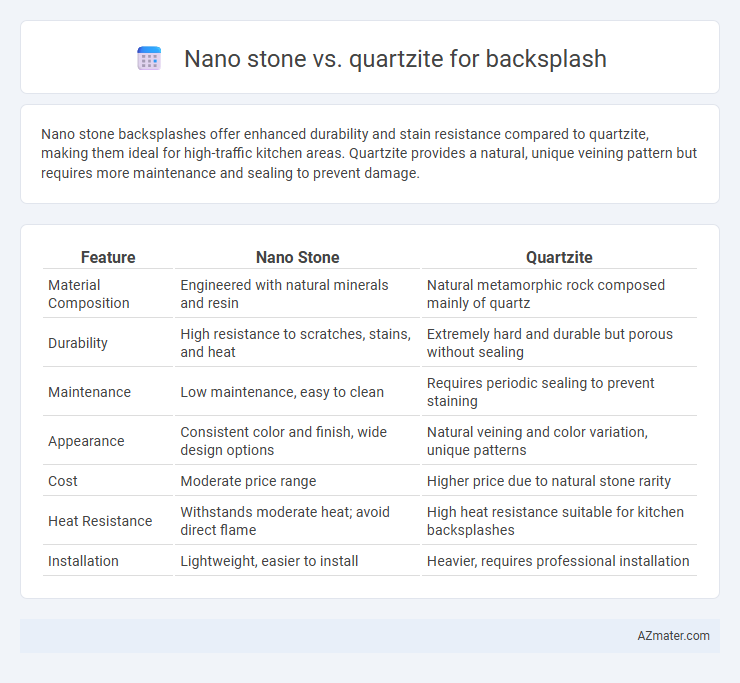Nano stone backsplashes offer enhanced durability and stain resistance compared to quartzite, making them ideal for high-traffic kitchen areas. Quartzite provides a natural, unique veining pattern but requires more maintenance and sealing to prevent damage.
Table of Comparison
| Feature | Nano Stone | Quartzite |
|---|---|---|
| Material Composition | Engineered with natural minerals and resin | Natural metamorphic rock composed mainly of quartz |
| Durability | High resistance to scratches, stains, and heat | Extremely hard and durable but porous without sealing |
| Maintenance | Low maintenance, easy to clean | Requires periodic sealing to prevent staining |
| Appearance | Consistent color and finish, wide design options | Natural veining and color variation, unique patterns |
| Cost | Moderate price range | Higher price due to natural stone rarity |
| Heat Resistance | Withstands moderate heat; avoid direct flame | High heat resistance suitable for kitchen backsplashes |
| Installation | Lightweight, easier to install | Heavier, requires professional installation |
Introduction to Nano Stone and Quartzite
Nano stone features ultra-fine particles fused under intense heat and pressure, resulting in a highly durable, non-porous surface ideal for kitchen backsplashes. Quartzite, a natural metamorphic rock formed from sandstone, offers superior hardness and a striking, natural veining pattern favored in backsplash installations for its resistance to heat and scratches. Both materials provide excellent longevity and aesthetic appeal, but nano stone excels in low maintenance and stain resistance compared to the more porous quartzite.
Composition and Material Properties
Nano stone backsplashes consist of engineered materials combining natural stone particles with resin binders, offering enhanced durability and uniformity. Quartzite backsplashes are made from natural metamorphic rock primarily composed of quartz, known for exceptional hardness and resistance to heat and scratches. Nano stone provides superior stain resistance and low porosity, while quartzite delivers a natural, high-strength surface ideal for heavy-use areas.
Aesthetic Appeal and Color Variations
Nano stone offers a sleek, uniform aesthetic appeal with consistent color patterns ideal for modern kitchen backsplashes, while quartzite showcases natural veining and a wide spectrum of earthy tones that enhance rustic or classic designs. Quartzite's rich color variations and unique mineral formations create a dynamic, textured visual impact, making each backsplash distinctly individual. In contrast, nano stone's engineered composition ensures precise color control and minimal variation, appealing to homeowners seeking a polished, contemporary look.
Durability and Scratch Resistance
Nano stone offers exceptional durability and scratch resistance due to its engineered composition of natural minerals and resins, making it highly suitable for backsplashes in high-traffic kitchens. Quartzite, a natural stone formed from sandstone and quartz, provides superior hardness and abrasion resistance but is generally more porous and prone to etching compared to nano stone. Both materials withstand daily wear effectively, but nano stone's non-porous surface enhances its resistance to stains and scratches, ensuring long-lasting performance in backsplash applications.
Maintenance and Cleaning Requirements
Nano stone backsplashes offer superior stain resistance and require minimal maintenance, making them ideal for easy daily cleaning with mild soap and water. Quartzite, while durable and heat-resistant, needs regular sealing to prevent stains and maintain its appearance, necessitating more frequent upkeep. Both materials benefit from non-abrasive cleaners, but nano stone provides a more hassle-free maintenance routine in high-traffic kitchen areas.
Heat and Stain Resistance Comparison
Nano stone offers superior heat resistance, withstanding temperatures up to 650degF, making it ideal for kitchen backsplashes exposed to hot pots and pans. Quartzite is also heat resistant but generally tolerates temperatures up to 480degF, which may lead to discoloration or damage under extreme heat exposure. In terms of stain resistance, nano stone is non-porous, effectively repelling oils, acids, and common kitchen stains, whereas quartzite requires periodic sealing to prevent absorption and staining.
Installation Process and Complexity
Nano stone backsplashes offer a streamlined installation process due to their lightweight nature and uniform thickness, making cutting and fitting easier for precise results. Quartzite, a natural stone with varying density and hardness, requires specialized tools and expert handling during installation to avoid chipping and achieve seamless joints. The complexity of quartzite installation often results in higher labor costs and extended project timelines compared to the more user-friendly nano stone alternatives.
Cost Analysis: Nano Stone vs Quartzite
Nano stone backsplashes typically cost between $50 to $100 per square foot, offering a more budget-friendly option compared to quartzite, which ranges from $70 to $150 per square foot due to its natural stone properties. Installation costs for nano stone are generally lower because it is lighter and easier to cut, reducing labor expenses. Quartzite demands higher maintenance and can incur additional sealing costs over time, impacting the overall lifetime investment compared to the more durable, low-maintenance nano stone.
Environmental Impact and Sustainability
Nano stone backsplash offers significant environmental advantages due to its manufacturing process, which often incorporates recycled materials and consumes less energy compared to quartzite quarrying. Quartzite, a natural stone, requires extensive mining that disrupts ecosystems and involves high carbon emissions from heavy machinery and transportation. Choosing nano stone supports sustainability by reducing resource depletion and minimizing the carbon footprint associated with natural stone extraction.
Which Is Best for Your Kitchen Backsplash?
Nano stone offers superior durability and scratch resistance, making it ideal for high-traffic kitchen backsplashes. Quartzite provides a natural stone aesthetic with heat resistance and unique veining, adding elegance and character. Choosing between them depends on whether you prioritize low maintenance and strength or natural beauty and heat endurance for your kitchen backsplash.

Infographic: Nano stone vs Quartzite for Backsplash
 azmater.com
azmater.com